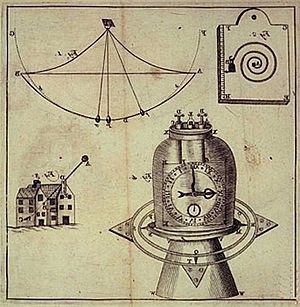Jeremy Thacker facts for kids

Jeremy Thacker was an interesting person from the 1700s. He was a writer and possibly a watchmaker. For a long time, people thought he was the first to use the word "chronometer". This word describes very accurate clocks. These clocks were designed to help sailors find their exact location (called longitude) while at sea. However, an older mention of the word has since been found by William Derham.
Thacker is known for writing a book called The Longitudes Examin'd. It was published in London in 1714. This is where the word 'chronometer' first appeared. In his book, Thacker claimed he built and tested a special marine chronometer. This clock was placed on gimbals, which are like swiveling supports, and kept in a vacuum. He also said that he would test it on real sea voyages. Other experts have since thought that these tests probably didn't work. The idea of putting a sea clock in a vacuum had already been suggested in 1668 by an Italian clockmaker named Antimo Tempera. Later, a famous clockmaker named John Harrison successfully built amazing sea clocks starting in 1730.
Was Jeremy Thacker Real?
In 2008, an article in the Times Literary Supplement brought up an interesting question. A writer named Pat Rogers wondered if Jeremy Thacker ever truly existed. Rogers suggested that Thacker's ideas might have been a joke or a trick. He thought that Thacker could have been made up by another writer, John Arbuthnot. Rogers believed that The Longitudes Examined was actually a type of funny writing called satire. It was meant to make fun of people who were trying to win big prizes for solving the longitude problem.
However, not everyone agreed with this idea. Two experts on John Harrison, Jonathan Betts and Andrew King, disagreed. They pointed out that Rogers himself admitted there were good reasons to believe Thacker's work contained some real science. This means that even if it was partly a joke, it still had serious scientific ideas in it.
 | Kyle Baker |
 | Joseph Yoakum |
 | Laura Wheeler Waring |
 | Henry Ossawa Tanner |

